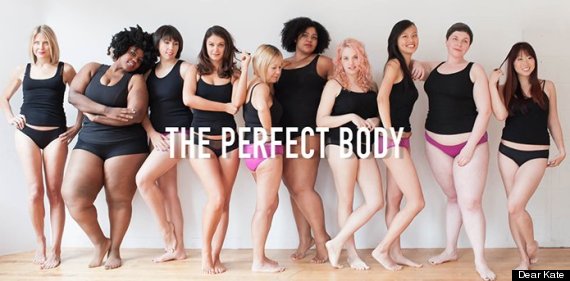As a bigger girl, I've grown up researching a lot of diet trends and exercise routines and all that jazz to no avail. I mean, I'm still a big girl. But the issue wasn't that I failed keeping up with fad diets and exercise plans, it had more so to do with the fact that these articles and lists spoke to me like I didn't have a problem, but rather I was the problem.
That just rubbed me the wrong way. I was being told, "You know why you're fat? Because you aren't doing everything on this list the right way." These articles used this tactic to guilt trip and shame people on the road to healthiness.
On the other side of the spectrum, a lot of bodypos blogs just preach about loving your body, which is great, but I needed more than that. I needed to learn how to make a lifestyle change regarding what I ate, and how I went about eating, without being told that I was doing everything wrong.
I was lucky enough to stumble upon Isabel Foxen Duke's blog, Stop Fighting Food, where she doesn't tell me what I'm doing wrong, but instead what I could be doing right. I don't feel like I'm being talked down to while reading her posts, but instead motivated and cheered on along the way. It's kind of like when you're best friend is like "I have a better idea."-- you're not mad that your friend one-upped you, you're just glad they found a better way.
That being said, I should probably inform you that that's exactly what she does. She coaches people into redefining their relationship with food, which doesn't mean dieting, but rather not being so hard on yourself for what you decide to and to not eat.
My favorite thing about her blog is just how darn relatable it is. For example, I personally find that I'm always either super critical of what I decide to eat, or I'll binge-eat everything in sight. (Don't tell anyone, but I totally binged this weekend-- and it was so worth it.) She has a post where she talks about this phenomenon-- the never-ending binge/diet cycle-- where you oscillate between the two. After binging for the weekend, I'll watch what I'll eat for the entire week, only to binge the next weekend. It never endsss! But let me tell you, this girl gets it.
Her posts are short and sweet, and straight to the point. She doesn't really have paragraphs-- I'm pretty sure she just hits the "return" button like whenever she feels like it. Some of her sentences are split into multiple lines. Take this example:
When you let yourself be controlled by your fear of gaining weight,
because you believe the walls will cave in around you or the Earth will burst into flames if you do,
that’s when the cycle begins.
Okay, let's talk about a couple different things, because I am ~obsessed~ with how she speaks to me. It puts my head back on straight, and it makes me feel empowered.
This is one sentence broken up into three parts. The first part is the intro, it's completely bog-standard, leading up to the main point of the sentence. The second portion of the sentence is italicized-- oooh, exciting. It's relatable through the use of metaphors; her metaphors are so dramatic, but when you're trying to lose weight THIS IS EXACTLY HOW YOU FEEL ABOUT GAINING WEIGHT. Italicizing those metaphors is like "you know you're overreacting right?" It gives a bit of a sarcastic tone. And then boom, the third portion. Not only is it italicized, but it's bold. You thinking the world will burst into flames if you gain weight is the instigator to the binge/diet cycle. The cycle has begun because of your dramatic feelings about food. She puts everything into perspective. She just hits you with the harsh truth - bold and italicized- that you being irrational about gaining weight is leading to your own demise. PREACH.
Another issue I have, is that I'm an emotional eater. When the stress of deadlines and midterms becomes so overwhelming, there is nothing I'd rather do than eat a pint of ice cream and cry to the One Direction movie. Most of us who are trying to get healthy see emotional eating as the devil. We can't help wanting to eat because of our emotions, but we know it's sooo wrong. Duke gets it though. She understands, she knows it happens. And it's okay. She's sees it as a blessing, not a curse. It's not a disease or a problem, but it's heaven-sent.
When we strip away the judgement of our emotional eating, and stop calling it a disease, a defect, a problem in and of itself;
we can finally see it for what it is:
An alert that something in our life needs our attention. Something completely unrelated to food or our weight.
Some people never deal with their problems, because they’re never forced to.
They never leave the job they hate, because they’re not getting fat over it.
They don’t have the tough, but necessary conversations with their partners, because things aren’t “bad enough.”
But emotional eaters have a gift;
a unique opportunity to recognize when some aspect of their lives needs some T.L.C. A.S.A.P.
Emotional Eating is a reminder to love yourself harder, show up for yourself, and give yourself what you really need.
Be grateful for the reminder. It might be saving your ass.
Here, I see her use of italics as almost a gentle kind of tone. Sort of motherly, serious but kind. Her bold sentence let's us know exactly her point-- that emotional eating is helping you out. It's letting you know that you have an issue at hand, and that after you eat your body weight in brownies, you have some business to take care of. "But emotional eaters have a gift " -- here, she is reminding us that it isn't a problem, it's nothing to be ashamed of; it's something to embrace and be proud of. Emotional eating is "a unique opportunity", a "reminder" we should be grateful for, and it's "saving your ass." Her word choice just makes me feel like she is my life coach. It's sweet, but you know she isn't messing around.
I find that in a lot of her posts, italicizing her words makes her voice come off as being understanding and friendly. Her bolded lines tend to convey a tone of seriousness, without sounding mean or harsh. It emphasizes her main points. All of her words are encouraging and reassuring, never hurtful or rude. By having short lines, her voice comes off as conversational. It stresses different parts of the sentences, that work in her favor, and make a simple message almost twice as meaningful. Her voice throughout her posts is helpful and approachable-- she sounds like someone you could vent to, and get some kick-ass advice out of.
It doesn't make me feel like I'm in the wrong, like so many other articles make me feel. Her blog doesn't make me feel like I have a major weight problem, and that I have to fix it right now or the world is going to end. Her blog reminds me that it's okay to struggle with your weight, and it's okay to have feelings towards eating. I just want to hug her for letting me know that I am doing just fine on my road to body positivity and health.


















